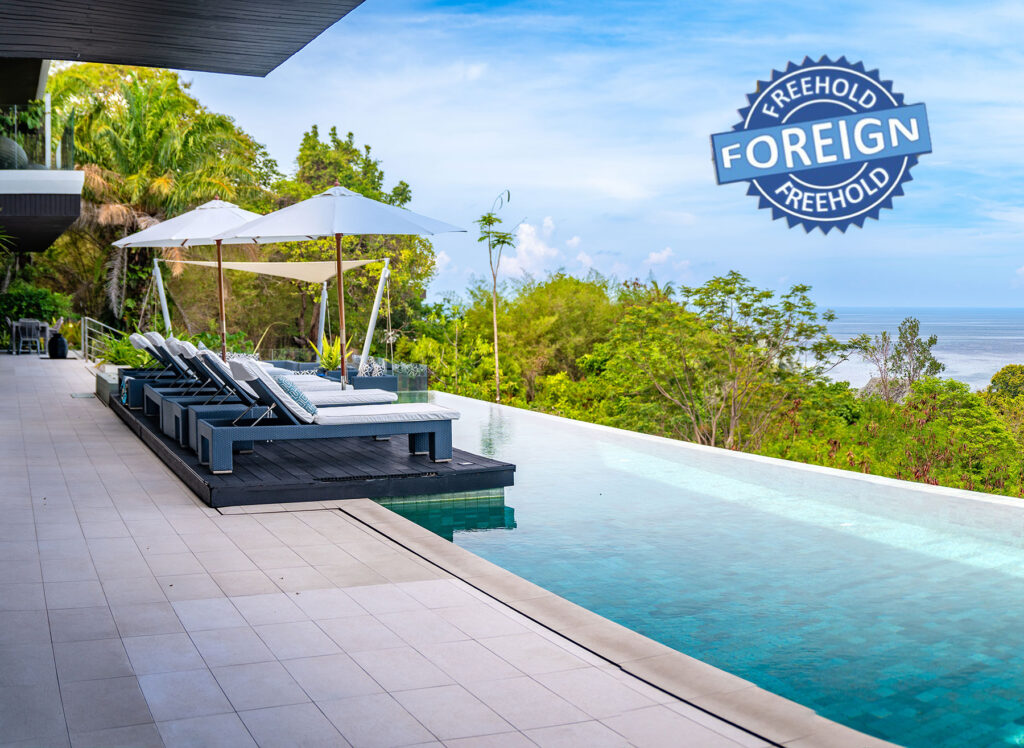When I was recently discussing with an agent on the ground in Phuket about the most suitable options for a villa client with a mid-range budget, the crux of the conversation was that he would be better off exploring freehold condominium options as an alternative, due to the uncertainty and complexities of corporate holding structures, bearing in mind he was looking for perpetual ownership and security at a reasonable cost. Phuket, with its diverse choice of freehold condominium offerings, reputable and experienced developers, and branded projects, accounting for around 20% of properties on the market, is well positioned to meet this shift in demand. In this article, we explore whether this is likely to become a more dominant trend, given the unpredictable global climate and ongoing ambiguities surrounding current and future freehold villa ownership structures.
The Legal and Economic Backdrop
Foreign investment in Thai property is currently shaped by two forms of uncertainty. The first is macroeconomic: global trade tensions, unconventional policymaking by the U.S. administration, geopolitical concerns, and shifting investor priorities have created a more cautious environment. The second is legal: Thailand’s 2024 nominee crackdown has intensified scrutiny of foreign landholding structures, particularly those used to acquire freehold villas. There is also a lack of clarity for the future, due to government announcements in 2024 regarding proposed changes to foreign property ownership laws – most notably, the proposition to extend the current 30-year lease term to 99 years. These proposals may or may not become law, but the point is that the uncertainty is now tangible.
For foreign buyers seeking security and clarity, freehold condos represent the most stable form of ownership. Unlike villa purchases involving Thai companies or leasehold contracts, freehold condos offer a perpetual title within a legally established framework. In times of volatility, simplicity matters.
This growing preference is reflected in agent behaviour. Throughout 2024 and into 2025, there has been a noticeable tendency among reputable agents to guide prospective villa buyers, particularly in the entry-level to mid-market segment, toward freehold condominiums. While corporate structures may still be viable for investors intending to operate a genuine rental business, either at the luxury end of the market or where multiple villas are held within the same entity, the purpose of the company must be to generate profit. For most lifestyle buyers, however, the administrative burden and ongoing compliance requirements make this route far less practical. In these cases, freehold condominiums represent a more straightforward and secure alternative for perpetual property ownership.
Surge in Supply and Sales
The strength of this shift is supported by hard data. Last year, both the supply and sales of condominiums grew at roughly three times the rate of villas. Phuket condo launches rose by 148%, compared to a 51% increase for villas. Sales figures told a similar story: condo transactions rose by 60%, while villa sales grew by just 18% (source: Knight Frank Research)
These figures indicate that developers and buyers alike are leaning heavily toward the condominium segment. Importantly, the rise in sales suggests that the market is absorbing new supply well, alleviating concerns about overbuilding. Condominiums, both freehold and leasehold, now represent roughly 85% of Phuket’s total residential supply.
Developer Credibility and Branded Confidence
In uncertain times, security matters more than ever. One of the defining trends in 2024 was the increased presence of well-established developers and branded residential projects. These players not only raise the bar in terms of quality and design but also offer an added layer of security to buyers.
This is especially important in the leasehold segment, where renewal terms and long-term viability depend heavily on the developer’s integrity. Buyers are far more likely to feel secure entering into a renewable lease agreement when the counterparty is a globally recognised brand or a reputable local developer with a long-term reputation at stake.
The combination of branded offerings and credible developers, across both freehold and leasehold properties, supports broader investor confidence and helps position Phuket condominiums as a defensible asset class in an unpredictable global climate.
Legal Alternatives: The Villa-Condo Hybrid
While standard freehold villas face legal headwinds, Phuket offers a lesser-known but increasingly relevant alternative: villa-format condominiums. These developments deliver the privacy and layout of a villa, but are structured under the condominium legal framework, allowing foreigners to hold freehold title.
It would be natural to expect developers to respond to legal enforcement trends by bringing more of these villa-condo hybrids to market. However, such developments are lower in density and may be less profitable, meaning commercial considerations could limit supply. Whether this niche expands meaningfully in response to buyer demand remains to be seen, but it will be an important trend to monitor.
The Samui Factor: A Shift in Focus
Phuket may also benefit from ownership uncertainty in other Thai resort markets. Some investors considering mid-market villas in Koh Samui have begun redirecting their focus to Phuket, where freehold condominiums offer a clear and legally robust alternative. With a broad supply base across all price points, Phuket is well positioned to absorb that redirected demand.
Resilience Over Speculation
Thailand’s national planning agency, the NESDC, recently downgraded its 2025 GDP forecast by more than 35%, citing growing concern over global trade disruptions and economic instability (source: Bangkok Post). While the long-term impact on infrastructure development remains to be seen, the downgrade underscores the broader shift in investor priorities: from speculation to resilience.
Phuket’s condo sector, supported by legal clarity, strong demand, and credible developers, is increasingly viewed as a defensive real estate play, offering security in unpredictable times. With the uncertainty and volatility of 2025 likely to continue, the fundamentals suggest that Phuket’s condo market is not just surviving, it may yet surpass the record performance of 2024.
View more insights about the property market of Phuket.
